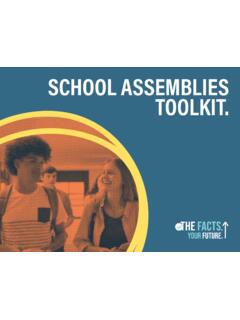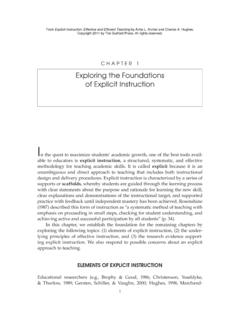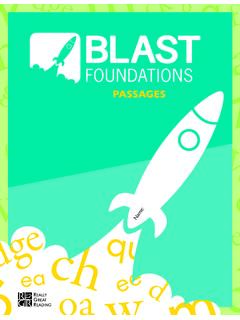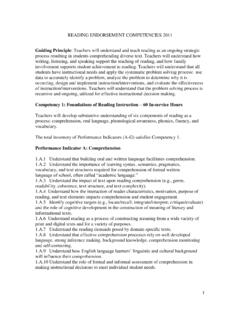Transcription of Table of Contents
1 Table of Contents Table of Contents .. 1 5 Standards Map .. 10 Progression of Foundations Benchmarks .. 11 Spiraled Standards in a Vertical Progression .. 13 Kindergarten .. 26 Foundational Skills .. 26 Reading .. 27 Communication .. 29 32 Sample texts by benchmark .. 33 1st Grade .. 35 Foundational Skills .. 35 Reading .. 36 Communication .. 38 40 Sample texts by benchmark .. 41 2nd 43 Foundational Skills .. 43 Reading .. 44 Communication .. 45 48 Sample texts by 49 3rd Grade .. 51 Foundational Skills .. 51 Reading .. 51 Communication .. 53 55 Sample texts by 57 4th 60 1 Foundational Skills .. 60 Reading .. 61 Communication .. 62 65 Sample texts by benchmark .. 66 5th 69 Foundational Skills.
2 69 Reading .. 69 Communication .. 71 73 Sample texts by benchmark .. 75 6th-8th Grade .. 78 6th 78 Reading .. 78 Communication .. 80 82 Sample texts by 83 7th 86 Reading .. 86 Communication .. 88 90 Sample texts by 91 8th 95 Reading .. 95 Communication .. 97 99 Sample texts by 100 9th-12th Grade .. 104 9th 104 Reading .. 104 Communication .. 107 109 2 Sample texts by benchmark .. 110 10th 114 Reading .. 114 Communication .. 116 118 Sample texts by benchmark .. 119 11th 125 Reading .. 125 Communication .. 128 130 Sample texts by benchmark .. 131 12th 136 Reading .. 136 Communication .. 139 140 Sample texts by benchmark .. 142 6-12 Foundational Reading Intervention Standards.
3 145 Appendix A: K-12 ELA Expectations for Students .. 147 K-12 ELA Expectations .. 147 Appendix B: Reading .. 148 What is a Text?.. 148 Text Complexity .. 148 Literary Periods .. 165 Background Knowledge .. 168 Civic Literacy Reading List .. 168 Text 172 Text Structures .. 174 Figurative Language .. 175 177 Archetypes .. 178 Types of Logical Reasoning .. 180 Fallacies in Reasoning (Informal) .. 181 3 Appendix C: Communication .. 183 Communicating through Writing .. 183 Writing Types .. 183 Narrative Techniques .. 184 Elaborative Techniques .. 185 Oral Communication .. 186 Elementary Oral Communication Rubric .. 186 Secondary Oral Communication Rubric .. 189 Conventions Progression by Grade Level .. 196 Appendix D: Vocabulary.
4 198 Selecting Academic Vocabulary for Direct Instruction .. 198 Morphology .. 199 Base Words .. 199 Greek and Latin Roots .. 200 Common Prefixes .. 202 Common Suffixes .. 203 Foreign Words and Phrases .. 204 Context 205 Word 205 Appendix E: Reading Foundations .. 206 206 207 Dolch Word Lists .. 207 Fry Word Lists .. 208 Measures of Fluency .. 209 Interventions for Secondary Students .. 211 Learner 211 Learning Environment Considerations .. 211 Glossary of 212 4 5 Introduction On January 31, 2019, Governor DeSantis issued Executive Order 19-32, outlining a path for Florida to improve its education system by eliminating Common Core and paving the way for Florida students to receive a world-class education to prepare them for jobs of the future.
5 The task from Governor DeSantis to Commissioner Corcoran was clear: Create literacy standards for our Florida students that will shape their education and secure their position as leading the charge to make Florida the most literate state in the nation. The outcome is Florida s Benchmarks for Excellent Student Thinking ( ) Standards for English Language Arts (ELA), a product of Florida literacy experts, Florida educators, and vested stakeholders. Florida s Standards encourage educators to act on Douglass s reminder of the ultimate purpose of education. His words confirm that education must be enlightening, noble, and good. He speaks from a tradition that holds education in the highest regard. The Latin root of the word education is educare, which means to bring forth, to bring up.
6 Douglass understood that education is the way to bring forth our greatest capacities. Knowledge is the pathway to liberty, which is a fundamental value guaranteed by our government. Florida s Standards promote Douglass's noble view of education. The implementation of these standards will encourage schools, districts, and educators to adopt and build a rich, deep, and meaningful curriculum that uplifts the soul. It is important to note that these standards are only the framework. It is up to Florida educators to use these standards to build knowledge-rich curricula that will nurture students by immersing them in the study of great works of literature, history, and the arts. The goal of these standards is to restore teachers to their true calling: educating the hearts, souls, and minds of their students, bringing them into the glorious light of truth.
7 In the words of John Adams, Let us tenderly and kindly cherish, therefore, the means of knowledge. Let us dare to read, think, speak, and write. 5 What Matters: Cornerstones of Reading Comprehension These standards emphasize that literacy is not achievable merely through a skills-based approach to reading comprehension. Lessons designed to instill background knowledge and a deep respect for literary works that transcend time because of the truth of their content and the beauty of their craft are critical to building life-long learners. Foundational Instruction Matters In the early grades, the standards emphasize explicit , systematic phonics instruction as the foundation of literacy. Decoding and fluency are essential to creating proficient readers.
8 Readers who have strong decoding skills can figure out unfamiliar words so quickly that the process requires no conscious effort, says Dr. Holly Lane, Director, University of Florida Literacy Institute. When decoding is effortless, a reader s limited working memory is freed up so the reader can focus on meaning. Knowledge Matters Reading comprehension depends more on relevant background knowledge than on mastery of reading strategies. Knowledge acquisition should be the primary purpose of any reading approach, starting at the earliest grades. The systematic building of a wide range of knowledge across domains is a prerequisite to higher literacy. Knowledge builds upon knowledge. Reading comprehension develops as students engage with literary and informational text selections that are complex, rich, and meaningful.
9 The greatest reading comprehension tool is not a set of strategies or tools that are content-free; rather, it is a well-stocked mind. Critical thinking cannot be separated from the object of that thinking. We cannot think deeply, creatively, or critically about a subject if we have little knowledge of it. Thus, the key to developing real critical thinking skills in our students is to increase knowledge about a breadth of subjects by reading rich texts on the subjects. Curriculum Matters If knowledge acquisition is a core component of reading comprehension, then how the content is organized and presented to students is the foundation of an effective curriculum. The specificity of these standards, along with the clarifications and appendices, will make it easier for educators, schools, and districts to build or select a coherent, cumulative, and knowledge-based curriculum that is vertically aligned across grades and horizontally aligned across subjects within a grade.
10 These standards are the foundation on which a robust curriculum will be built with a full appreciation of history, art, music, and other disciplines that were sidelined in favor of a focus on abstract reading strategies. These standards encourage a broader view of literacy that promotes knowledge-building across varied domains and subjects, making the integration of content and collaboration among teachers much easier to achieve. 6 Leadership Matters Governor DeSantis, upon taking office, realized that for an education system to be successful, choice and excellence had to be the pillars of the system. Recognizing that our students and their families required and deserved more from their education, he issued the executive order to create the best standards in the nation.









